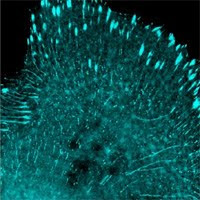Human embryonic stem (ES) cells or induced pluripotent stem (iPS) cells promise to serve as an unlimited source for transplantation or tissue-specific differentiation. However, obtaining and maintaining stem cells are very difficult tasks for multiple reasons. For instance, most stem cell lines tend to spontaneously differentiate in culture, and even if the cells form stem cell-like colonies, they may be of a heterogeneous population.
To identify pluripotency of stem cells, expression of stem cell-specific marker genes (i.e. Oct-3/4, Sox2, Nanog, Rex-1) is monitored by RT-PCR. Alkaline phosphatase activity and methylation profiles of promoters of pluripotency-relevant genes are often analyzed as well. Compared to murine cells, it is noticeably more difficult to obtain human iPSCs, of which stem cell-like colonies sometimes turn out not to be pluripotent cells. We highly recommend testing iPSCs, especially human iPSCs, with antibodies against stage-specific embryonic antigens such as SSEA-3, SSEA-4, TRA-1-60, and TRA-1-81.
Clink here to read what research reagents are available from Allele Biotech
New product of the week 01-25-10 to 01-31-10:
All-In-One-Vector: Human OSKM Lentiviral Paticles, with Oct-4, Sox-2, Klf, and c-Myc all expressed from a single virus, ready-to-use.
Promotion of the week:
human iPS cell detection primer set, the same as the landmark Yamanaka paper [4] on creating human iPS for the first time.
Friday, January 29, 2010
Monitoring the Undifferentiated Stage of Stem Cells—the Pluripotency Markers
Subscribe to:
Post Comments (Atom)




Stem cell therapy has revolutionized the ways treatments are done. My brother is planning to undergo stem cell therapy early next year for ATS. Though there is a lot still left to be invented, I hope he benefits from all the research that is out there.
ReplyDeleteHope
http://www.princetoncryo.com